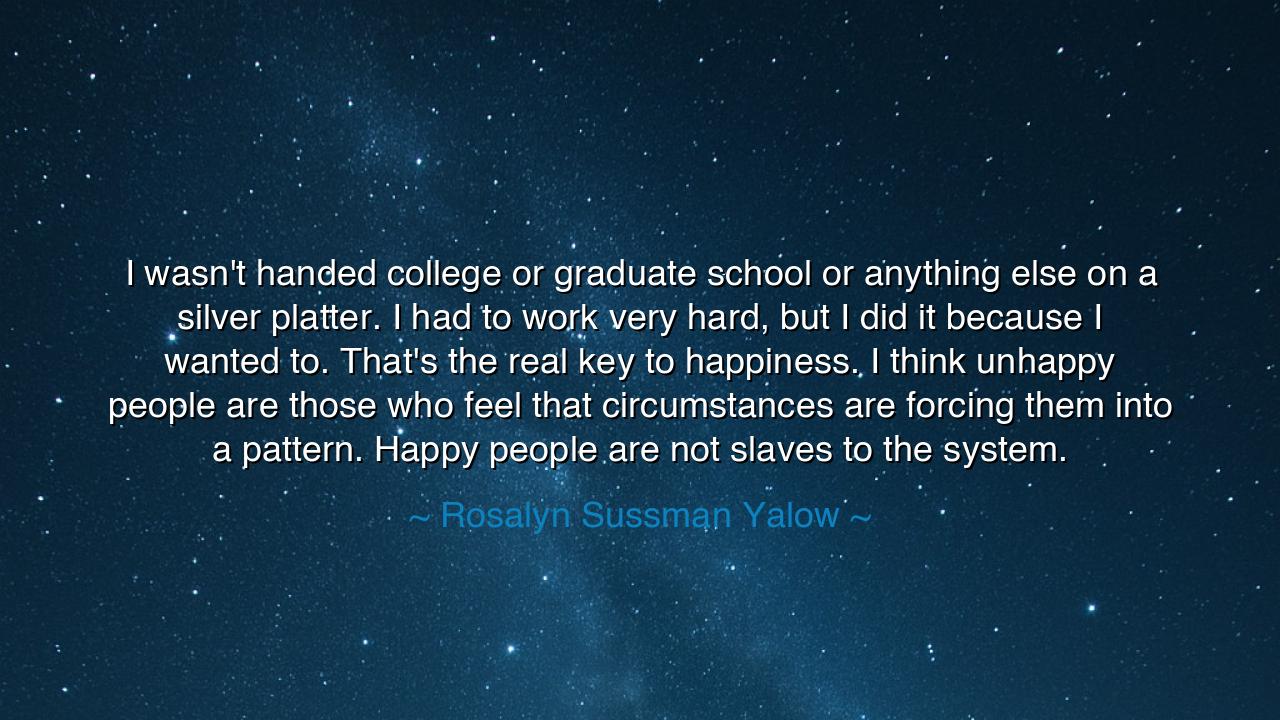
I wasn't handed college or graduate school or anything else on a
I wasn't handed college or graduate school or anything else on a silver platter. I had to work very hard, but I did it because I wanted to. That's the real key to happiness. I think unhappy people are those who feel that circumstances are forcing them into a pattern. Happy people are not slaves to the system.






“I wasn’t handed college or graduate school or anything else on a silver platter. I had to work very hard, but I did it because I wanted to. That’s the real key to happiness. I think unhappy people are those who feel that circumstances are forcing them into a pattern. Happy people are not slaves to the system.” — Thus spoke Rosalyn Sussman Yalow, a woman of science and spirit, a pioneer whose mind and resolve broke barriers in a world that often sought to confine her. In these words, she reveals not merely her story, but a universal truth — that happiness is born not of ease, but of purpose, and that freedom does not come from privilege, but from the inner will to shape one’s own destiny. Her wisdom burns like a torch for all who seek meaning in a world that tempts them toward complacency.
Rosalyn Yalow, born in 1921 in the Bronx, rose from modest beginnings to become one of the great figures of modern medicine. She co-developed radioimmunoassay, a breakthrough technique that transformed endocrinology and earned her the Nobel Prize in Physiology or Medicine in 1977. Yet, behind her triumphs was not a life of favor or ease. She faced poverty, gender bias, and academic gatekeeping — barriers meant to silence her ambition. But rather than yield, she worked tirelessly, not because she was told to, but because she wanted to. Her passion was her strength, and her effort, freely chosen, was her joy. She understood that the spirit grows not through comfort, but through the disciplined pursuit of what the heart loves.
In saying she was not handed life on a silver platter, Yalow rejects the illusion that happiness is found in entitlement or circumstance. Many people believe that fortune, wealth, or privilege guarantees joy — yet those who have everything often drift in emptiness. True fulfillment, she teaches, comes from ownership — from knowing that one’s life, however difficult, is self-made. For when effort is freely chosen, it ceases to be a burden; it becomes an expression of freedom. In this, Yalow echoes the wisdom of the ancients: that the soul of man is happiest when it acts according to its own reason and desire, not when it is bound by the will of others.
She warns also of the tragedy of those who feel trapped — “unhappy people are those who feel that circumstances are forcing them into a pattern.” This is the slavery of the modern age: not the bondage of chains, but the quiet imprisonment of conformity. Those who live only to meet the expectations of society, who follow paths chosen by others, find their spirits starved and restless. To such souls, life feels like compulsion, not creation. In contrast, the happy person — as Yalow defines them — is one who acts with purpose and autonomy, whose choices spring from the well of inner conviction. The happy person may labor long and face hardship, but their heart remains light, for they walk a path of their own choosing.
History is filled with such examples of freedom through purpose. Consider the life of Frederick Douglass, who was born a slave and taught himself to read in secret. Though bound in body, his mind refused to be enslaved. “Knowledge makes a man unfit to be a slave,” he said, and through the pursuit of learning, he liberated not only himself but countless others. Douglass, like Yalow, understood that true freedom — and thus true happiness — lies not in comfort, but in the power to direct one’s own life. Both reveal that liberty is not a gift granted by the world, but a victory won in the heart.
The ancients would have called this the freedom of the virtuous — the state in which one’s actions arise from one’s deepest self, not from external coercion. Aristotle taught that happiness (eudaimonia) is not pleasure, but the flourishing of one’s soul through excellence in action. Yalow’s life embodies this principle. She did not chase approval, nor did she bow to the systems that sought to limit her. She lived by the truth that every person, no matter how small their beginnings, has within them the capacity for greatness if they dare to labor for it with love and conviction.
The lesson of her words is as luminous as it is demanding: if you wish to be happy, do not wait for the world to hand you peace. Take ownership of your journey. Work hard — not because others command you to, but because the work itself fulfills your soul. Refuse to let your life be shaped by fear or by the cold machinery of expectation. When you act freely, guided by what you value most, even toil becomes joy, and failure becomes growth.
So remember this, my child: happiness is not comfort; it is freedom of the spirit. You are not a product of the system unless you let yourself be one. Choose your path not by what is easy, but by what is true. Work not for applause, but for meaning. And when life withholds its silver platter, be grateful — for in the absence of privilege, you will find the presence of power. Like Rosalyn Yalow, forge your destiny with your own hands, and in that labor, you will discover the highest form of happiness — the joy of a life freely and courageously lived.






AAdministratorAdministrator
Welcome, honored guests. Please leave a comment, we will respond soon